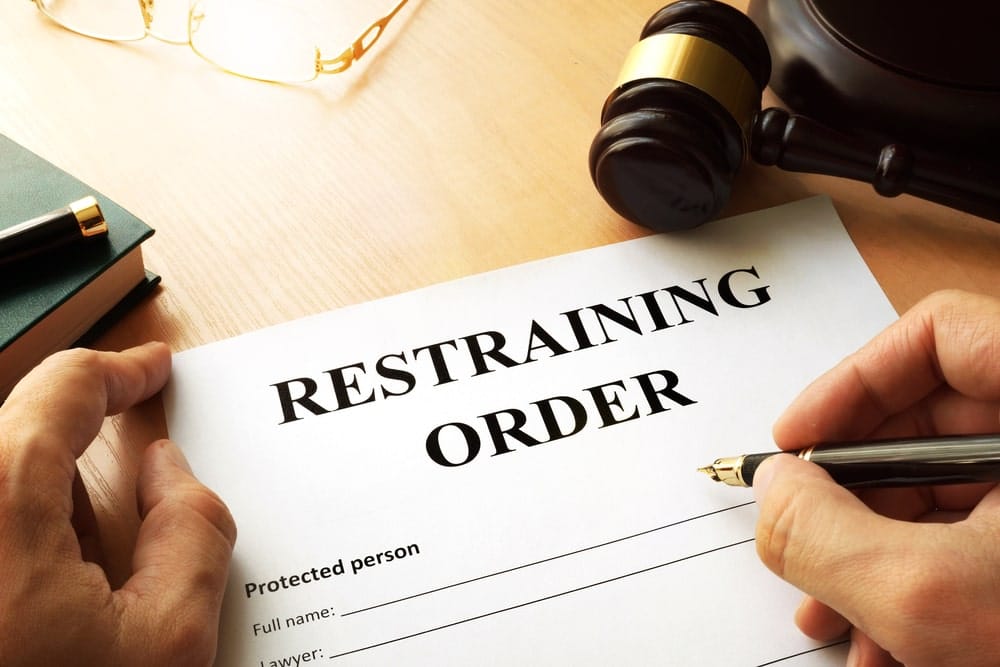Protection from Abuse Orders (PFAs), such as restraining orders and no-contact orders, are frequently issued by the courts in domestic violence cases in Maine but are often confused. No contact & protective orders are designed to protect the filing party (and any children) from suffering potential abuse or further harassment from the restrained person.
If you are the subject of such an order, it is essential to understand what it means because disobeying court orders is a serious violation and can result in criminal penalties, including jail time. Don’t risk a violation of a protective order. Find out what conditions and obligations are included in the order and follow them to the letter.
Call 207-571-8146 or contact us online to schedule a consult with one of our highly skilled OUI/DUI & criminal defense attorneys, serving Maine, today.
Table of Contents
How are protection orders issued in Maine?
To successfully file a protection order request in Maine, the plaintiff must reasonably believe that legal protection is required to prevent domestic violence and abuse, sexual violence or stalking.
Specific guidelines are set out under Maine law to define the legal grounds for a protection order being issued. If any of the following acts involving family or household members or dating partners occur, a protective order may be sought by the plaintiff:
- Attempting or causing bodily injury or offensive physical contact, including sexual assault
- Attempting or placing another in fear of bodily injury by threatening or harassing behavior
- Forcing a person to engage in conduct the person has the right to abstain from
- Credibly threatening or committing a crime of violence against a person
- Repeatedly, without reasonable cause, following someone, or being at his or her home, school, or workplace
- Kidnapping and/or false imprisonment
What do protection orders include?
The type of information included in a protection order depends on the nature of the order.
No-contact orders are usually issued after a threatening encounter has already occurred, while a restraining order is granted because of the potential for a dangerous situation to occur. Therefore, they may contain different information and stipulations.
Generally, however, protective orders include the following:
- A ban from contacting, harassing, following or physically harming the protected person and any children or animals in the home
- Exclusion from the home, school or workplace of a protected person
- Temporary decisions on spousal/child support, child custody, visitation, and pet custody
- A requirement to attend counseling
- A ban from possessing firearms
- A stipulation to refrain from taking or damaging property belonging to both parties
- An order to pay expenses, such as medical bills, court costs, and attorney fees
Depending on the nature of the protective order, it may also include decisions on the division of property and the termination of a life insurance policy.
What happens if a protection order is violated?
If you’ve been accused of threatening behavior towards a family member or dating partner in Maine and are the subject of a protective order, it’s essential to know what you can and cannot do.
Violating the terms of a protective order can have serious consequences, including:
- Arrest and charge with a criminal offense
- Requirement to appear before a judge
- A potential Class C or Class D violation
- Penalties that include up to five years in state prison or a fine of up to $5,000 (Class C violations)
How long does a protective order last in Maine?
When a protective order is issued by a judge, it will state the expiration date. Temporary orders last until a final order is issued. Judges have the discretion to make the final order last beyond the standard maximum of two years.
When the period of the protective order expires, the petitioner may ask the courts to extend the length of time on the order. If there are reasonable grounds for this, the extension is likely to be granted but if the petitioner is no longer considered to be in danger, the order may be ended.
Call 207-571-8146 or contact us online to schedule a consult with one of our highly skilled OUI/DUI & criminal defense attorneys, serving Maine, today.
What is a no contact order in Maine?
A no contact order in Maine is a legal directive issued by the court requiring a defendant to avoid any contact with the victim following an alleged incident of domestic violence, abuse, stalking, or sexual assault. This order prohibits all forms of communication, including physical proximity, phone calls, social media, and text messaging.
The order typically specifies a required distance the defendant must maintain from the victim. Violating a no contact order is a serious offense that can result in jail time and other severe legal consequences, such as loss of parental rights. It is essential to comply with these orders and seek legal guidance to address the charges effectively.
Can a mutual no-contact order be filed?
If a protective order has been filed against a particular defendant, that individual cannot then attempt to file a mutual restraining order against the plaintiff. Sometimes, an attempt is made for retaliatory reasons but this will not be approved in the State of Maine.
What should you do if you are the subject of a protective order?
If you are the subject of a restraining order or a no-contact order, you must follow the instructions included in the order precisely or risk being arrested and charged with a criminal offense.
Legal representation can provide clear directions that help to keep you out of trouble and resolve your situation in your best interests.
If the protective order has been wrongly issued, your lawyer can help you work towards getting the restrictions lifted.
Do no-contact orders specify distances to keep away?
If you are the defendant in a no-contact order, you could be ordered to keep a certain distance away (specified in feet or yards) from the plaintiff and any other parties mentioned in the order. It’s best to keep at least that distance away — preferably considerably more — and not to visit the home, school or workplace of the protected party or parties, which are always listed as off limits to the defendant in a no-contact order.
The order will also limit your ability to communicate with the plaintiff, often prohibiting phone calls, text messaging, and video calls as well as physical contact. Phone records may be accessed to ensure compliance.
Judges tend to be extremely cautious in domestic violence matters and their main duty is to protect the threatened parties, especially if children are involved.
For legal advice and assistance with protective orders in Maine, call the Maine Criminal Defense Group at 207-571-8146 for an initial case evaluation.
Call 207-571-8146 or contact us online to schedule a consult with one of our highly skilled OUI/DUI & criminal defense attorneys, serving Maine, today.
Blog Posts

Page last updated on October 3, 2025 Skilled Defense Against Your Maine Domestic Violence Charges Being charged with domestic violence in Maine is a serious legal matter with consequences that[...]

A domestic violence conviction can have serious consequences in Maine Assault, criminal threatening, and reckless conduct in domestic settings can all be classed as domestic violence in Maine—and criminal charges[...]

Defending those accused of domestic violence in Southern Maine Assault, criminal threatening, and reckless conduct in domestic settings can all be classed as domestic violence in Maine—and criminal charges can[...]

Sexual assault and sexual battery both refer to criminal offenses where a victim does not provide consent to sexual contact. This contact may or may not involve penetration, force, violence,[...]

The domestic violence and stalking laws in Maine are currently being updated to address some shortcomings in the previous laws and to add clarity for both victims and accused parties[...]

Page last updated on October 3, 2025 In recent years, convictions for domestic violence offenses in Maine have increased as state prosecutors rigorously pursue cases. This has led to harsher[...]

Crimes of domestic violence in the state of Maine can be confusing. This is because crimes of domestic violence are really just other crimes, like assault or battery, when those[...]

A protection from abuse order (PFA) can make it illegal for an individual to contact you or your children in the state of Maine. Filing a PFA is often a[...]

This article was updated December 12, 2025 Oftentimes what I see in these domestic violence situations is that a husband and wife get in a fight. They love each other.[...]

Domestic violence cases can be some of the most challenging to deal with for everyone involved. Families with children can be thrown into turmoil with emotions running high. Many people[...]
